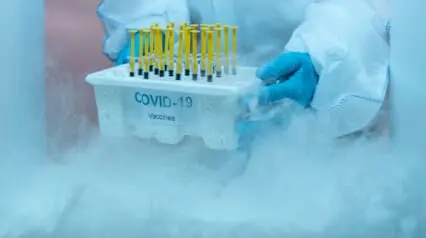What is Vaccine Cold Chain Management?
Vaccine cold chain management is a systematic approach to handling vaccines, which plays an important role in maintaining the integrity and effectiveness of vaccines. Vaccines are sensitive biological products, so they require specific temperature conditions to ensure their potency and efficacy.
Importance
Vaccine potency can be compromised if they are exposed to inappropriate temperature conditions. Vaccine cold chain management ensures that vaccines are stored and transported within recommended temperature ranges to maintain their quality and effectiveness.
Key Components
Vaccine cold chain management comprises several interconnected components that work together to guarantee the optimal storage and distribution of vaccines:
Temperature Monitoring
Continuous temperature monitoring is essential to track and maintain the appropriate temperature range for vaccines. This involves using temperature-sensitive devices and data loggers to ensure that vaccines are not exposed to temperatures that could render them ineffective.
Cold Storage Facilities
Specialized cold storage facilities, such as refrigerators and freezers, are used to store vaccines at specific temperature ranges. These facilities are equipped with temperature controls and alarms to prevent deviations from the required conditions.
Transportation Protocols
During transportation, vaccines must be kept within the recommended temperature range. Refrigerated trucks and insulated containers are used to ensure that vaccines remain viable while in transit.
Training and Education
Healthcare professionals involved in handling vaccines receive training on proper cold chain management procedures. This includes understanding the importance of temperature control, monitoring, and emergency response.
Best Practices in Vaccine Cold Chain Management
Maintaining an effective vaccine cold chain requires adherence to best practices to ensure that vaccines remain potent and effective:
- Proper Organization – Vaccines should be organized in storage units to facilitate easy access and prevent temperature fluctuations when retrieving doses.
- Regular Temperature Checks – Regularly monitor and record temperatures of storage units to identify and address any deviations promptly.
- Vaccine Handling – Follow proper handling procedures to prevent exposure to unnecessary temperature changes. Minimize the time vaccines spend outside of recommended temperature ranges.
- Emergency Protocols – Develop and implement emergency protocols to address power outages, equipment failures, and other unexpected events that could affect temperature control.
Explore SafetyCulture Monitoring Solution
Utilize advanced sensor technology to monitor assets, automate vital alerts, implement actions, and report urgent issues.
Talk to an expertRegulatory Guidelines and Compliance
Vaccine Cold Chain Management is subject to strict regulatory guidelines to ensure the quality and safety of vaccines:
World Health Organization (WHO)
The WHO provides comprehensive guidelines for vaccine storage and distribution, emphasizing the importance of maintaining the Cold Chain.
National Regulatory Authorities
Each country has its own regulatory authority that enforces guidelines for the proper handling and storage of vaccines within its borders. Some of these governing bodies include the following:
- US – Centers for Disease Control and Prevention (CDC)
- EU – European Medicines Agency (EMA)
- Australia – Australian Government Department of Health and Aged Care
Good Distribution Practice (GDP)
GDP guidelines outline the standards and requirements for the proper distribution of pharmaceutical products, including vaccines. These guidelines emphasize maintaining the quality, safety, and efficacy of vaccines throughout the distribution process.
International Air Transport Association (IATA)
For vaccines that require international transportation, the IATA offers guidelines specifically designed for air cargo shipments. These guidelines cover packaging, labeling, and temperature control to maintain the integrity of vaccines during air travel.
FAQs About Vaccine Cold Chain Management
Temperature monitoring should be continuous, with data recorded at regular intervals. Daily monitoring is generally recommended to promptly identify any deviations from the required temperature range.
Yes, different vaccines have specific temperature requirements for storage and transportation. These temperature ranges are provided by vaccine manufacturers and regulatory agencies to maintain vaccine potency.
Generally, vaccines should not be refrozen once they have thawed. Thawed vaccines can lose effectiveness, and refreezing them can further compromise their quality.


